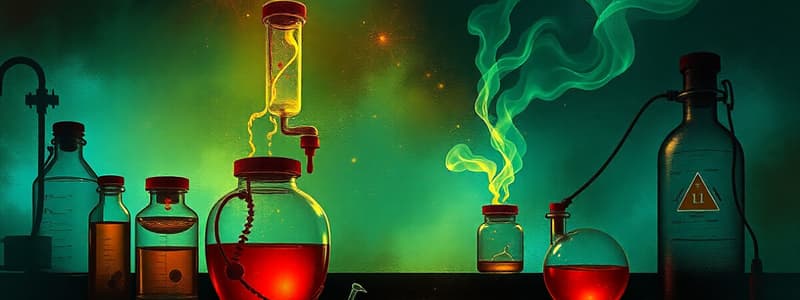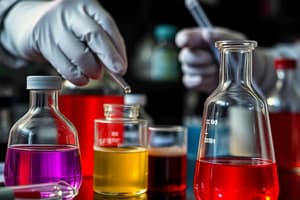Podcast
Questions and Answers
What is forensic chemistry?
What is forensic chemistry?
It includes the chemical side of criminal investigation.
Which of the following is NOT a stage in the work of a forensic chemist?
Which of the following is NOT a stage in the work of a forensic chemist?
- Collection or reception of the specimen
- The actual examination of specimen
- Communication of the result of examination
- Legal defense preparation (correct)
What does 'proof' represent in forensic chemistry?
What does 'proof' represent in forensic chemistry?
- A simple fact
- A snapshot of a crime scene
- The degree of evidence needed to convince a court (correct)
- A written statement
What are the three major classifications of evidence?
What are the three major classifications of evidence?
Real evidence requires explanation for identification.
Real evidence requires explanation for identification.
Match the form of scientific evidence with its description:
Match the form of scientific evidence with its description:
What is the role of an expert witness?
What is the role of an expert witness?
Which type of witness testifies based solely on personal impressions?
Which type of witness testifies based solely on personal impressions?
Flashcards are hidden until you start studying
Study Notes
Introduction to Forensic Chemistry and Toxicology
- Forensic chemistry and toxicology involve the chemical aspects of criminal investigations.
- Analysis of materials relevant to legal proceedings is critical.
- Applications extend beyond purely chemical questions to areas like legal medicine, ballistics, questioned documents, dactyloscopy, and photography.
- Examples of forensic chemistry and toxicology applications include:
- Determining if a location is a clandestine laboratory.
- Examining marked bills or suspects in extortion cases.
- Performing paraffin tests.
Four Stages of Work for a Forensic Chemist
- Collection or reception of specimens/evidence:
- Ensure sufficient sample size.
- Secure a standard for comparison.
- Maintain individuality of the sample.
- Properly label and scale the sample.
- Examination of the specimen.
- Communication of the examination results.
- Court apparatus:
- Present evidence to the court.
Potential Issues with Specimens/Evidence Handling
- Improper packing of the specimen.
- Improper preservation of the specimen.
- Failure to properly identify the specimen.
- Improper precautions taken during transmission.
- Lack of precautions to prevent tampering.
Types of Evidence
- Direct Evidence: Directly establishes the main fact of an issue. It is based on the witness's sensory experiences (sight, hearing, smell, touch, taste).
- Indirect/Circumstantial Evidence: Establishes a fact by proving another fact. It seeks to establish a conclusion through inferences from proven facts.
- Real Evidence: Comprises tangible objects presented in court to prove or disprove a fact. It speaks for itself and requires no further explanation.
Forms of Scientific Evidence
- Real or Autoptic Evidence: Evidence that addresses the senses of the court. It includes not only sight but also hearing, taste, smell, and touch.
- Testimonial Evidence: Expert witness testimony in court. This involves a solemn declaration made orally under oath, responding to lawyer's questions. It is the expert's description of factual truth.
- Experimental Evidence: Evidence requiring expert witness demonstration through experiments to prove a point. The court may or may not allow this kind of evidence.
- Documentary Evidence: Any written evidence presented by an expert in court, relevant to the case, and not excluded by the Rules of Court.
Types of Witnesses
- Ordinary Witness: Can state facts, but not opinions or conclusions. They can testify about general observations (like vehicle speed or voice characteristics).
- Expert Witness: Possesses specialized skills or knowledge beyond general understanding. They can provide opinions and conclusions based on their expertise.
- Eye Witness: Someone who saw the act in question.
- They must have the capability to perceive and communicate their perceptions to others.
- They must not fall under any exceptions to witness qualifications outlined in the Rules of Court.
Key Differences Between Ordinary and Expert Witnesses
- An ordinary witness can only state what they perceived, while an expert witness can also provide opinions, deductions, and conclusions based on their perceptions.
- An ordinary witness may not be skilled in the area they are testifying about, while an expert witness must be skilled in their art, science, or trade.
- An ordinary witness cannot testify about things they have not personally perceived, while an expert witness can testify about things they have observed, providing their opinions and conclusions.
Studying That Suits You
Use AI to generate personalized quizzes and flashcards to suit your learning preferences.



